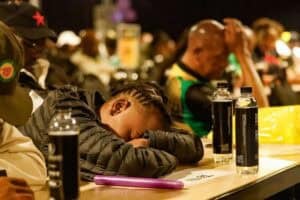Nationwide polls are almost certain to return the ruling ANC to power despite anger over corruption scandals, sluggish growth, and record unemployment.

The election is the first measure of whether President Cyril Ramaphosa can reinvigorate support for a party whose backing rests largely on its liberation credentials, but now faces the prospect of a reduced majority.
“We want to be set free from this poverty,” said Moxolo Gqetywa, 48, an unemployed mother of two girls as she waited to vote in Soweto.
Ramaphosa, 66, took over last year after the ANC, which first swept to power in 1994, forced then-President Jacob Zuma to resign after a nine-year term dominated by corruption allegations and a struggling economy.
Zuma oversaw the party’s most significant drop in support in the democratic era.
“This is a vote that reminds us of 1994… heralding a new period,” Ramaphosa said after casting his ballot at a school in Chiawelo, Soweto, and described himself as “excitedly confident” of the outcome.
“I am truly humbled by the turnout… it’s a vote for the democratic system we have been building for 25 years,” he said.
“This is like a rocket booster for democracy.”
The 1994 vote saw Nelson Mandela and the African National Congress take power in the country’s first multi-racial polls, marking the end of apartheid.
Support for the ANC has fallen in every election since 2004 with the party taking 54 percent in 2016 municipal elections, compared with 62 percent in 2014’s national vote.
Most opinion surveys suggest the ANC will secure nearly 60 percent of the Wednesday’s vote, thanks to Ramaphosa’s appeal and a fractured opposition.
“It reflects the weakness of the opposition, more than it does reflect the achievements of the ANC,” said political scientist Collette Schulz-Herzenberg from Stellenbosch University.
‘Not happy with the ANC’
The ANC has been confronted by deepening public anger over its failure to tackle poverty and inequality in post-apartheid South Africa.
“We have given them 25 years but the poor are getting poorer and the rich richer,” said voter Anmareth Preece, 28, a teacher from Coligny in North West province. “We need a government that governs for the people, not for themselves.”
The economy grew just 0.8 percent in 2018 and unemployment hovers around 27 percent — soaring to over 50 percent among young people.
Of the 47 opposition parties in the race, only the main opposition centrist Democratic Alliance (DA) and the radical-left Economic Freedom Fighters (EFF) are major players.
The DA is hoping to shed its image as a white, middle-class party.
Its first black leader, Mmusi Maimane, is contesting his maiden general election since taking the helm in 2015, and is expected to make modest gains on the DA’s 2014 vote share of 22 percent.
“Vote for the future of this country and the South Africans who are unemployed,” Maimane said after voting in Soweto, insisting the poll was not “a beauty pageant but a contract” between voters and their representatives.
‘People died for us to vote’
“This vote is about competence… so we can clean up this country,” added Maimane, wearing a suit in the DA’s signature blue and posing for selfies with voters.
But the EFF, founded six years ago by former ANC youth leader Julius Malema, is predicted to make major gains, growing from 6.3 percent to a forecast 11 percent.
“A lot of people died for us to vote — we are here to honour their memories,” said Malema as he cast his ballot in Seshego in eastern Limpopo province.
“If you need change, EFF is the way to go,” added Malema, sporting his signature red and a green baseball cap with a red star.
The party, which appeals mainly to young voters and the poor, has campaigned on a policy of seizing land from white owners to give to blacks.
Enforced land redistribution is also ANC policy — alarming some investors.
About 26.8 million voters are registered to cast their ballots at 22,925 polling stations countrywide.
Polls opened at 7:00 am (0500 GMT) and are due to close at 9:00 pm.
Preliminary results will emerge on Thursday, with an official winner declared on Saturday.
The party that wins the most seats in parliament selects the country’s president, who will be sworn in on May 25.
“The outcome of this election will be a major boost for investors… and investor confidence, it’s about confidence and about the future,” Ramaphosa said after making his cross.
“We apologise for our mistakes.”
The Independent Electoral Commission has warned ahead of the poll that “there are recurring themes of disinformation with every election”.
William Bird, director of Media Monitoring Africa, said misinformation efforts appeared not to be coordinated, “but more just a collective of idiots”.
For more news your way, download The Citizen’s app for iOS and Android.






